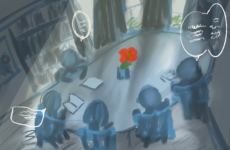
Graphic courtesy of Yujin Kim ’23
Dear Choate Community,
We are the Wellness Committee, a student-run initiative focused on improving student wellness at Choate. Led by three seniors and advised by Dr. Francisco Lopez, the committee is composed of 16 Choate students. Most of you probably don’t even know we exist. And if you do, you’re probably wondering, “What do they even do?” So, to demystify it all, we ask you to read this letter as a behind-the-scenes look into the Wellness Committee, from the perspective of those who both experience its shortcomings and are simultaneously tasked with addressing them.
It is reasonable to conclude that student wellness, no matter how you define it, is turbulent on the Choate campus. Sit in any common room during check-in and watch exhausted, stressed, and emotionally drained students walk in and fist bump the adviser on duty. This isn’t to say that there aren’t moments when we feel successful and unburdened — the duality of both experiences is synonymous with being a student here at Choate.
We’ve been told to take an occasional mental health day, seek out counseling, or go for a walk when we feel unusually stressed, but what about problems that can’t be solved within the confines of a free block? More profound alterations need to be made — not by individual students but by those in charge of engineering their experiences. This is where the Wellness Committee steps in — along with the Choate administration.
The Wellness Committee meets weekly to discuss issues of student wellness, brainstorm how to best approach and solve them, and put these plans into action. Currently, our overarching goal is to provide two-fold education: first, on the resources offered to students through Choate, and second, on issues of sexual, mental, and physical health.
We currently have three counselors to provide care for 868 total Choate students. Of those students, 35% to 40% reached out to the counseling services at least once during the 2020-2021 school year. Unfortunately, these numbers aren’t sustainable, with counselors having 25-30 scheduled appointments every week and students feeling as though they don’t receive the undivided attention of the counseling staff. From its creation, this has been a paramount concern of the Wellness Committee, and it’s proven difficult to demonstrate the urgency of this issue to the administration.
Additionally, with the recent dissolution of the Faculty Wellness Committee and the termination of the bi-weekly Lifelong Wellness Program (which once acted as a forum to talk about these issues), we are now the only group on campus backed by the administration that has the resources and ability to creative new initiatives bettering student wellness. The bi-weekly Lifelong Wellness Program wasn’t popular among Choate students — in fact, unanimous dissatisfaction with the program was a factor that led to its discontinuation. While we agree that the curriculum wasn’t the most productive approach to wellness, having the space to discuss issues too taboo for the average classroom is imperative.
Without any form of wellness education, we have 16-year-olds who haven’t had a single sex-ed class, students struggling with complex mental health issues who don’t know when it’s time to reach out for help, and the uneducated normalization of drug and alcohol abuse. While this information can be learned elsewhere, and wellness programming may not be the perfect solution to these issues, it’s part of the responsibility of any high school, especially a boarding school, to open these conversations.
Our first initiative to combat the hole left by the absence of a Wellness Curriculum is the compilation of wellness-related resources in a single, thorough document that can help students assess the correct avenues through which to approach wellness-related concerns. The second initiative will partner the Wellness Committee with other on-campus leaders, namely prefects and advisers, to educate them on the nuances of these issues and create formats for the facilitation of productive discussions on difficult topics.
Additional initiatives we’re currently working on include the optional inclusion of pronouns in the student and faculty directories, increasing the accessibility and quality of sanitary products in all restrooms, and creating a comprehensive presentation of on-campus mental health-related statistics and student testimonials to be presented to the entire community to garner support for bolstering our counseling staff.
We’re here to help fix the concerns you don’t feel you have the power to. So, with that, we ask that you reach out to our leaders, Rhea Shah ’22 (rshah22@choate.edu), Livia Fingerson ’22 (lfingerson22@choate.edu), and Tigo Ponce de Leon ’22 (tponcedeleon22@choate.edu), with the issues you think need more attention and the initiatives you think could aid in providing it.
Take some time for yourself today. Actually, please do it.
— The Choate Student Wellness Committee




